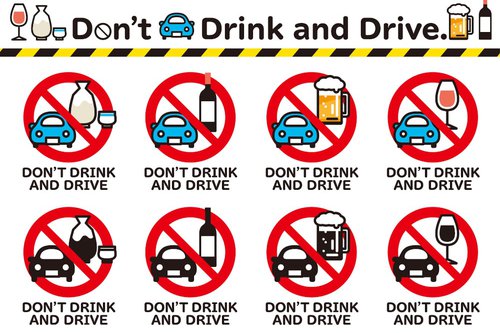Do Anti-Drunk-Driving Public Service Ads Work in Canada?

Do you recognize any of the following taglines?:
- “If you don't stop your friend from drinking and driving, you're as good as dead."
- “No mom should have motherhood taken away."
- “If you drink, then drive, you're a bloody idiot."
- “Why aren't their licenses taken away before they kill someone."
- “Each drink you have before driving impairs your judgement."
- “Drinking and driving can kill a friendship!"
- “If you're impaired, request a safe ride home."
- “Friends don't let friends drive drunk."
- “Happy Mother's Day is the only call your mother should receive."
- “It's a smart world — don't be stupid about how you get around."
- “Barely high is still too high to drive."
- “Buzzed driving is drunk driving."
- “Don't drink and drive."
These taglines are from just a few of the hundreds of public service ads (PSAs) that have appeared in the U.S. and/or Canadian media over the past 40-some years warning the public about the dangers of drunk (and, more recently, drugged) driving. You probably recognized “friends don't let friends drive drunk" due to its extensive, decades-long, international use since it first premiered in a PSA on New Year's Eve 1982. As an Ontarian, perhaps you recognize “Happy Mother's Day is the only call your mother should receive," as it was a powerful drunk-driving PSA released by the Toronto Police Services in 2013. Or perhaps you recognize “barely high is too high to drive," part of the Ontario government's 2019 PSA campaign against driving under the influence of marijuana.
The question is, how many of the remaining listed taglines help you recall their associated impaired driving PSAs, and can you think of any other such PSAs off the top of your head? As a relevant follow-up question, we'll ask whether you believe such impaired driving PSAs have effectively curbed drunk and drug-impaired driving.
With more than three decades of defending Greater Toronto Area drivers against impaired driving charges, the lawyers of TorontoDUI would suggest that the answer to the follow-up question is “no." Our business remains robust, and the courts are overflowing with ongoing DUI cases. However, we will take a closer look into the issue to see if we can find evidence that impaired driving PSAs are effective.
A Bit of PSA Background
Public service ads (PSAs) have been around since at least the 1860s when the U.S. government ran a U.S. war bond campaign in the nation's major newspapers during its war against the Confederacy. The campaign proved so successful that it is credited with launching the modern commercial advertising industry. Whether published in newspapers and magazines, broadcast on the radio and TV, displayed on billboards or posted on the Internet, PSAs are a staple of today's mass media advertising. PSA subject matter has run the gamut over the decades to cover such topics as pedestrian safety, littering, forest fire prevention, child abduction, disease awareness, drug abuse, and drunk driving, to name a few.
PSAs are released by all levels of government, non-governmental organizations, public interest groups, private companies, and other entities. They are differentiated from commercial advertising by their goal of serving the public interest and free-of-charge dissemination by the media.
We were unable to uncover the origination of the first impaired driving PSA released in Canada, but the United Kingdom is credited with broadcasting the first-ever drunk driving PSA in 1964. The public advertisement was a short, black-and-white cartoon featuring characters enjoying a Christmas party and a tagline stating, “drinking and driving are dangerous."
The first-known U.S.-originated, televised drunk-driving PSA was broadcast in the mid-1970s. The black and white commercial begins with an unseen announcer declaring that “you are about to be taken for a ride by a killer — a drunken driver," as the image of a man's hands grabs the steering wheel and starts driving. Filmed from the driver's viewpoint behind the wheel, the car weaves through traffic while almost colliding with nine other moving vehicles and three pedestrians before crashing into a moving train at a railroad crossing. During this drive, the announcer informs viewers that “drunks are involved in almost 50% of all traffic deaths" and asks, “why aren't their licenses taken away before they kill someone?"
So, Are Impaired Driving PSA Effective?
In trying to assess the effectiveness of these PSAs, we were surprised to find that repeated Google searches using numerous different impaired driving PSA-related keywords produced limited results. The most detailed study we found on the issue — “ Social Marketing Campaigns Aimed at Preventing Drunk Driving " — was produced in 2009 by University of Regina and Thompson Rivers University researchers. The researchers noted that eight previous studies had concluded that PSAs were effective at reducing the number of alcohol-related crashes. The researchers went on to argue that while PSAs appear to help trigger behavioural change by stressing “threat variables" of impaired driving, they would be more effective if they provided “more specific advice about how to avoid drunk driving." From what we can tell, this advice seems to have been adopted, as many of today's impaired driving PSAs emphasize the use of designated drivers, cab rides, Ubers, and other alternative forms of transportation.
A 2011 article — “ Do anti-drinking Ads Work ?" — based on research out of Northwestern University, warns that some PSAs may backfire, as they can induce defensiveness in the viewer that may cause them to engage in the risky behaviour out of spite. The researcher found that PSAs that tried to use shame or guilt to influence behaviour actually caused people in the study to drink more.
“The most recent report we found on the subject was from 2017, which reviewed the correlation between drunk driving-related fatal traffic accidents and the volume of impaired driving PSAs in a given area. While we didn't pony up the $43.95 cost to purchase the study — “ Alcohol-control public service announcements (PSAs) and drunk-driving fatal accidents in the United States, 1996-2010 " — an article preview noted that the researchers concluded:
“Anti-drunk driving PSAs that are able to reach large audiences with frequent message exposures hold significant potential for reducing rates of fatal accidents caused by drunk driving. Future research should identify which anti-drunk driving messaging approaches are most effective…."
As for the most well-known “friends don't let friends drive drunk" PSA campaign, its “Advertising Council creator and sponsor claims that “at least 62% of Americans who saw the commercials have stopped someone from driving while drunk at some point in their lives." While the Advertising Council ignored the Canadian viewers, we know Canadians and assume that the percentage of our viewers who saw the commercials and stopped someone from driving while drunk at some point in our lives is much higher.
Failed to Heed the PSA Messaging? — Contact TorontoDUI
We trust that you have enjoyed our article on impaired driving PSAs and will pay attention to such public service advertising by heeding their warnings to not drive after consuming alcohol or drugs. If not, well, we have one of the Greater Toronto Area's best records for securing favourable outcomes for those arrested for DUI. To learn more, contact TorontoDUI for your free initial consultation.
